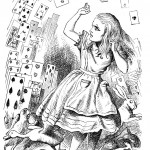 Quel ramo del lago di Como, che volge a mezzogiorno, tra due catene non interrotte di monti, tutto a seni e a golfi, a seconda dello sporgere e del rientrare di quelli, vien, quasi a un tratto, a ristringersi, e a prender corso e figura, tra un promontorio a destra, e un’ampia costiera dall’altra parte; e il ponte, che ivi congiunge le due rive, par che renda ancor più sensibile all’occhio questa trasformazione, e segni il punto in cui il lago cessa, e l’Adda ricomincia, per ripigliar poi nome di lago dove le rive, allontanandosi di nuovo, lascia l’acqua distendersi e rallentarsi in nuovi golfi e in nuovi seni.
Quel ramo del lago di Como, che volge a mezzogiorno, tra due catene non interrotte di monti, tutto a seni e a golfi, a seconda dello sporgere e del rientrare di quelli, vien, quasi a un tratto, a ristringersi, e a prender corso e figura, tra un promontorio a destra, e un’ampia costiera dall’altra parte; e il ponte, che ivi congiunge le due rive, par che renda ancor più sensibile all’occhio questa trasformazione, e segni il punto in cui il lago cessa, e l’Adda ricomincia, per ripigliar poi nome di lago dove le rive, allontanandosi di nuovo, lascia l’acqua distendersi e rallentarsi in nuovi golfi e in nuovi seni.
La costiera, formata dal deposito di tre grossi torrenti, scende appoggiata a due monti contigui, l’uno detto di San Martino, l’altro, con voce lombarda, il Resegone, dai molti suoi cocuzzoli in fila, che in vero lo fanno somigliare a una sega: talché non è chi, al primo vederlo, purché sia di fronte, come per esempio di su le mura di Milano che guardano a settentrione, non lo discerna tosto, a un tal contrassegno, in quella lunga e vasta giogaia, dagli altri monti di nome più oscuro e di forma più comune. Per un buon pezzo, la costa sale con un pendìo lento e continuo; poi si rompe in poggi e in valloncelli, in erte e in spianate, secondo l’ossatura de’ due monti, e il lavoro dell’acque.






